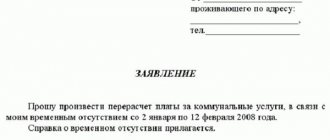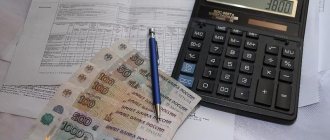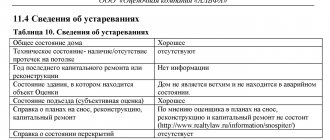Pravozhil.com > Housing and communal services issues > Utilities > Housing and communal services receipts > Does the number of registered ones affect the rent, how are payments calculated?
When calculating the amount of utility bills, not only the size of the living space is taken into account, but also how many citizens are registered in it
Does the number of people registered affect the rent? It's no secret that payments for utility services are calculated based on the square footage of the property and the number of registered people.
However, some services are charged based on the parameters of individual meters. Owners install these devices in apartments at their own expense.
Lately, this has been a fairly common way to save money for owners who have many people living in their apartments.
It is important to understand that the responsibility to regularly pay utility bills rests with the property owner. In exceptional cases, obligations, through contracts, are assigned to the tenants.
Does the number of people registered affect the rent? Let's take a closer look.
general information
In accordance with the law, each apartment owner must pay bills for services provided no later than the agreed date
According to Art. 155 of the Housing Code, the legislation defines the obligation of the property owner to pay for the services of companies no later than the tenth of the month, monthly.
The same law is fundamental for the procedure for calculating payment for housing and resources provided by management companies.
As a rule, the amount of payments is commensurate with the amount of consumption of a particular service.
But, when individual accounting devices are not installed in the residential premises, charges are made according to approved standards for each registered person per month. Does the number of people registered in an apartment affect the rent?
That is, the more people are registered, the higher the communal apartment will become. It does not matter here whether the persons are registered temporarily or permanently.
During their registration you will have to pay separately for all services provided. Exceptions will be made for some receipt items if there are meters.
The total payment for housing and communal services depends on several indicators:
- real estate square footage;
- payment tariff;
- number of registered persons;
- the presence of special counters.
There are always indicators that are taken into account only by the counter. Here, payment is made for the amount of service consumed per month. For example, electricity.
But, some indicators are calculated based on the number of registered people.
Normative base
The rent includes the amount that must be paid for the systematic provision of utilities. Its introduction is carried out on the basis of civil contracts, which are developed according to the classical scheme. Housing legislation imposes an obligation on apartment owners to regularly make payments for the use of utility services (Article 153 of the Housing Code of the Russian Federation).
Here is the main list of norms, laws and rules governing this point:
- Housing Code of the Russian Federation (Articles 155, 156, 158) - Federal Law No. 188 of December 29, 2004;
- by-laws – Rules for the provision of public services (government resolution No. 354 of 05/06/2011);
- Federal Law No. 261 “On Energy Saving” dated November 23, 2009
Please note:
In accordance with these standards, the responsibility for regularly paying for utility services rests with the owners and occupiers of real estate. At the very least, they are responsible for the timely repayment of debts.
How are payments for services made?
Payments for utility services are calculated according to tariffs approved by regional authorities
Recently, for city residents, the topic of calculating rent is probably the most popular.
In order to understand how accruals occur, you need to understand: for what and from what calculation the payment is made.
The first thing that is important is the types of services, they can be:
- utilities;
- housing.
The first includes the supply of resources necessary for a person. They make up about seventy percent of the entire payment.
Consumption per unit is paid at certain tariffs, which are approved by regional authorities. Usually this happens once a year.
It should be understood that they do not depend on who the payer is: the owner or the tenant. All payments are calculated using the same rules for everyone.
Calculation of penalties
Penalties are charged for late payment of utility bills.
A penalty is a fine that is assessed for late payment of bills. For late payments of rent, it is charged from the day following the date when the payment is due. Its amount is 1/300 of the central bank’s refinancing rate, and starting from the fourth month of delay – 1/170. You can find out the current rate on the bank’s official website. Penalties for rent are most often calculated monthly. Its accrual stops when the debt is fully repaid.
To explain with an example:
- Payment for February is due by March 10;
- On March 11, a penalty is charged in the amount of 1/300 of the refinancing rate;
- If payment is not made before the beginning of April, penalties are added to the rent amount;
- If the owner does not pay the debt by June 10, then from June 11 the amount will be 1/170 of the refinancing rate;
- To get rid of penalties, the owner must pay the entire amount of the debt and penalties in full by the 10th day of the month.
Penalties are not an obligation, but a right of the supplier, i.e. utility services do not charge them necessarily. However, service providers charge these amounts so as not to lose benefits. If the owner is unable to pay utility bills on time for a good reason, he must submit an application to the utility services for an installment plan or deferred payment.
Valid reasons are considered:
- Job loss;
- Salary reduction;
- Health status;
- Birth of a child;
- Death of a close relative.
In all these cases, it is advisable to apply as soon as such situations arise.
How to determine the share of each registered person
Determine each person’s share of payment for services by calculation
Does the rent depend on the number of people registered? Sometimes it is important for the owner to determine how much he needs to pay for a particular tenant.
It is important to understand that the share will be calculated approximately; it is impossible to track for each person how much he spent for a particular service.
To determine it, you need to divide the total amount for each appliance and rent by the total number of registered people.
This is the share of one registered person. It is possible to calculate simply by dividing the total payment amount among all registered persons in equal quantities. If there are meters, it is impossible to determine by eye how much each tenant individually burned light, consumed water or gas.
Therefore, the share will be approximate. It is possible to allocate shares more accurately if there are no meters, and payment for services is charged according to standards for each registered person.
Are counters always profitable?
Owners install individual metering devices in order to bear costs only for actually consumed resources. But this is not always economical.
Calculation of rent for water, if no one is registered in the apartment and there is no IPU, occurs according to the number of owners. Even when there is only one, but in fact there is a family of 5 consumers. In this case, it is profitable to pay the bill, which indicates the standard per person.
When 5-9 residents are registered, but in fact there are 1-2 of them, you can’t do without counting devices. They will help you save significantly, because it is easier to control your own expenses than to prove to the supplying company that the norm is not being spent.
Does the number of people registered affect the rent, and how exactly?
How does the number of people registered affect the rent? Let us consider in detail exactly what indicators and reasons will influence the amount of payment when registering additional persons.
Of course, this amount will affect the rent in the absence of meters.
In this case, for example, if at first one person was registered in the premises and someone else registered, therefore, the payment for gas, hot and cold water will double.
When registering three people, triple the amount and so on. The maintenance of housing and heating will remain unchanged; they are calculated based on the square footage of the apartments. Therefore, the answer to the question of whether the number of registered people affects the rent is quite simple.
The price of such services depends on the number of registered people:
- electricity;
- gas;
- cold and hot water supply;
- garbage removal.
Other types of payments do not depend on the number of registered persons.
When there are meters, this eliminates the dependence of payments from registered people in the premises. Therefore, if special metering devices are installed in the premises, the list of utility bills that depend on the number of registered ones is significantly reduced.
Types of payments
The payment document reflecting the list of paid services is a receipt, which is sent to the homeowner on a monthly basis. However, a detailed calculation of housing and communal services payments is not included in this document. It only indicates the types of services, indicating consumption rates and meter readings. Before paying, you need to clarify whether the invoice is correct.
Speaking directly about the general receipt for payment of utilities, it is necessary to indicate what types of payments should be included in the document in question:
- tariffs for water supply and sewerage, latest meter readings, or average cost per month;
- heating (in some houses it is calculated only during the heating season and is based on tariff indicators, and in some all year round in a single set amount);
- gas supply and maintenance, which also assumes an average indicator, or the results of reading the meter;
- electricity, which is reflected in the form of kW indicators per month;
- major repairs;
- maintenance of common property.
If additional services are available, the management company will also issue invoices for payment according to the tariffs.
Note! The receipt must contain information about the payer, the square footage of the premises and the personal account number. In addition, it is necessary to indicate tariffs and background information, otherwise the payment document cannot be considered correct.
Separate mention should be made about each type of payment, since they have their own characteristics of calculating payment and establishing average consumption indicators and tariffs.
For housing services
This category includes payments related to the maintenance of common property. There are no counter indicators provided here. The management company sets tariffs for intercom maintenance, cleaning, property maintenance, garbage removal, and so on. In this case, the cost should be determined according to the standards established by the region.
The cost of housing services is also confirmed by contracts with such suppliers. For example, the management of solid waste, that is, garbage removal, is provided by the relevant company of the city, with which the management company enters into an agreement, negotiates a price, and then, based on the agreement, issues an invoice to the homeowner.
For utilities according to standards
The list of utility bills includes payment for those services for which it depends either on the amount of consumption or on average standards. If the homeowner does not have metering devices, then the management company issues an invoice based on average indicators.
For example, accounting for the amount of water consumed in an apartment is not provided due to the lack of meters. The Criminal Code determines the average amount of consumption - 5 cubic meters of hot water per month, regardless of whether this amount is actually consumed or not. Accordingly, payment occurs at the regional tariff for 5 cubic meters. The owner can spend less or more hot water, the amount of payment will remain unchanged. The same principle applies when determining the cost of light and gas.
Gas supply
The cost of gas consumed is calculated using formulas that will differ depending on whether the homeowner has or does not have meters.
The following formulas are used for calculation:
- Q*T*N – option if there are no meters. Q is the number of cubic meters of gas consumed, T is the cost of one cubic meter, N is the standard. An example of the calculation is as follows: 8 cubic meters of gas, the cost of one cubic meter is 7 rubles, the current standard is 5. Thus, 10 * 7 * 5 = 350 rubles. This is how the cost of gas per month is determined based on average indicators. The amount of consumption does not actually matter.
- Q*T is an option if there are meters in the apartment. Calculation example: 4 cubic meters of gas and the cost of one cubic meter is 7 rubles. Thus, 4*7 = 28 rubles. That is, regardless of the number of people in the apartment and the standards, the owner will pay for the gas actually used.
It is more profitable to pay for gas supply according to the readings of the consumption meter; in practice, the average standards are always higher than the actual ones.
Payment obligations
Responsibility for late payment of utilities rests entirely with the apartment owners
All service providers enter into contracts with the housing company or the owners themselves.
Based on the concluded document, it is the owner of the apartment who is responsible for non-payment of utility bills. This is regulated by Art. 153 of the Residential Code.
That is why every property owner must ensure that all service providers receive timely payments.
There are three options to force people registered in the apartment to pay for services:
- Personal accounts section. It is suitable if the question concerns relatives.
- Threaten to end your registration.
- Submit a claim to the court.
The last two methods are suitable for dealing with tenants. The property owner has the right to unilaterally terminate the contract at any time for failure to pay utility bills.
When going to court, the judge will order the tenants to pay the utility debt if the owner provides evidence of lack of payments.
To do this, you need to pay it yourself on your own behalf. Thus, it will be clear that the owner himself was forced to pay for utilities.
The payment is always generated and addressed to the owner of the apartment. Can be made for several persons.
Utility debt can be recovered using:
- sanctions;
- failure to provide services;
- lawsuit;
- eviction.
From the listed punishments, it is clear that there are enough methods to scare defaulters. The worst way is to lose your living space.
There are many ways to force landlords to pay their utility bills on time.
But it may be easy to avoid such a situation.
For tenants of a social apartment, it is enough not to pay for it for six months to find themselves in worse conditions, for example, in a communal apartment.
From what point is rent charged in a new building?
In this situation, the costs are borne by the person on whose balance sheet the residential premises are located. While the house is being built, it is entirely on the balance sheet of the developer, and it is he who pays all the bills that arise. When the house is built, it is put into operation, utility bills are charged for it, but they are still paid by the owner of the house, i.e. developer.
The owner, tenant or tenant assumes the responsibility to pay bills at the time of purchase (rent, lease) of an apartment. Payments are calculated from the date of signing the relevant documents. In this case, it does not matter whether the owner lives in his apartment and whether he is registered in it. Payments can be reduced by confirming the need for this with the appropriate papers, but not canceled completely.
Special cases if no one is registered or registered, but no one lives
Quite often, parents purchase real estate for their growing child. For a long time it stands empty and waits for its owner.
What can you do with payments in this situation? The answer is clear and simple. Not paying at all is unlikely to work.
Again, heating and housing maintenance must be paid in any case. As for water, gas and electricity, it is better to install meters.
There will be no resource consumption, and therefore no payment needs to be made. Thus, it will be possible to minimize costs as much as possible.
You will still have to pay bills for an apartment in which no one lives, in order to reduce the amount of payments to a minimum - it is recommended to install meters
How are utility bills calculated if no one lives in the premises? Rent is still calculated and receipts are issued to this address.
In accordance with Art. 153 LCD owner is obliged to pay payments that are provided by the utility company.
This does not relieve him of the obligation to pay for services. However, there are ways in which you can reduce your housing costs.
When a person is registered at one address, but actually lives in another premises, then bills will still arrive.
In order to pay for utilities for people actually living, you will need to take a certificate from the location. It must be about where the person lives, then the payment will be increased at the place of his actual residence.
Along with the certificate, you need to write a corresponding application to the management companies. However, this is only beneficial when meters are not installed on the territory of registration.
After writing the application, payments will arrive edited. You should know that providing a certificate once will not be enough; this must be done once every six months.
Every person who purchases real estate for the future or wants to make money by registering people in their premises should understand the principle by which utility bills increase. He should also know ways to save on utilities.
Installing special metering devices for some types of services will help save a lot of money, regardless of the number of registered people.
For more information about the procedure for charging utility bills, see the video:
See also Phone numbers for consultation Oct 20, 2021 Yulia Yurievna 1298
Share this post
Discussion: 7 comments
- Alexey Igorevich says:
11/14/2016 at 03:48I advise everyone who has not yet installed water meters to do so as quickly as possible. The authorities have taken a course towards increasing prices for apartments without meters. For example, in the Sakhalin region, the fee for cold water in a one-room apartment where one person is registered already exceeds 400 rubles, how much in cubic meters you can calculate for yourself.
Answer
- Irina says:
12/14/2016 at 00:46
My children and I are registered in my grandmother’s apartment, but I don’t actually live there, but for the three of us, me and two children, she pays extra for water, because there is no meter, but electricity is metered.
Answer
- Anna says:
06/11/2017 at 03:47
I know from personal experience that it is pointless to sue housing and communal services and get anything from them. In any case, even if a person is registered and does not live there, you will have to pay for him. Of course, in this case, it is profitable to install meters and not worry about overpayment in the future.
Answer
- Evgeniya says:
07/14/2017 at 23:17
In our building, they began to take into account the number of people registered in the apartment when calculating the electricity spent on lighting the entrances quite recently. Previously, they only counted the total number of square meters in all apartments in the entrance and divided it into your “squares”.
Answer
- Aigul says:
08/09/2017 at 07:39
Hello, please tell me. If the social rental agreement and the decision of the housing commission indicate 3 people, but only 1 person is registered at the housing department’s passport office. For how many people should housing and communal services be accrued? The tenant submitted a request to the housing and communal services suppliers so that the accrual would be made for 3 people. How legal is this and is it necessary to register the remaining two family members in order to indicate the number of people as 3 instead of 1 in the Unified Payment Document.
Answer
- Vasya says:
02.11.2020 at 10:02
That is, if I am registered and do not live, then I have to pay, but if I am not registered and I pour tons of water, then I don’t have to pay. As a last resort, you can buy a fictitious temporary registration. A country of morons, the United States would sooner smash it into logs with tanks and shoot every Russian with a bullet.
Answer
- Julia says:
01/25/2021 at 14:09
The brother is registered with his son at the parents' apartment, but does not actually live in it, does this fact affect the payment of rent?
Answer
Required documents
You can recalculate the already accrued rent if you have the following documents:
- Statement on behalf of the service consumer.
- If there are no water meters, an inspection report is required to confirm that their installation was technically impossible.
- Official forms confirming the fact of departure and arrival. This could be a sick leave certificate for hospital treatment, or travel documents, a voucher to a sanatorium, etc.
The list of required papers depends on the situation; it can be clarified with the management company when submitting an application.
How to discharge those who are not in the house
If the rent is calculated based on the number of residents, unnecessary overpayments can be avoided. First you should talk to those who are registered in the living space, but do not actually appear there. Sometimes this helps - the former tenant simply registers at a different address.
But if he refuses to change his registration and does not want to pay rent, then he will have to go to court. The same should be done when the ex-tenant is difficult to find, he moved to another city or disappeared. The only way to solve the problem is to file a statement of claim in court. If the court decision is positive, all that remains is to simply transfer it to the passport office. The defendant must be discharged without his presence.









